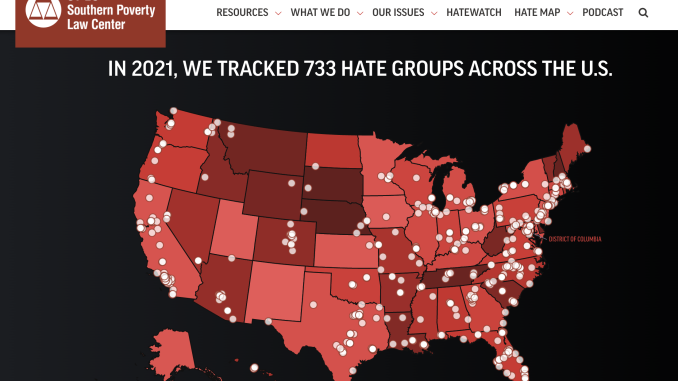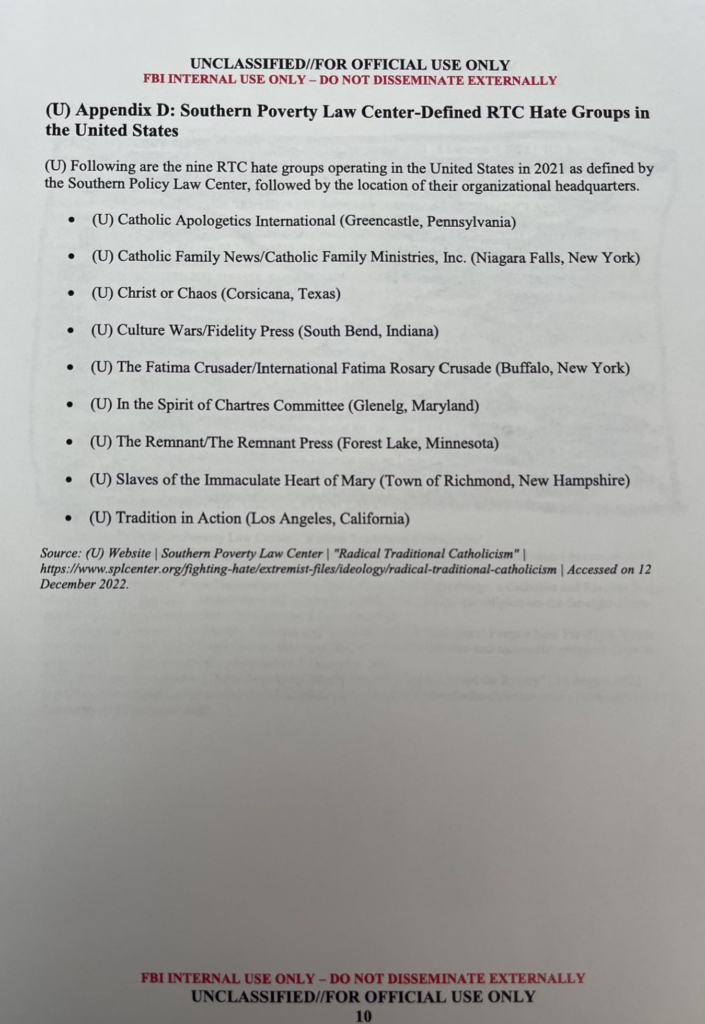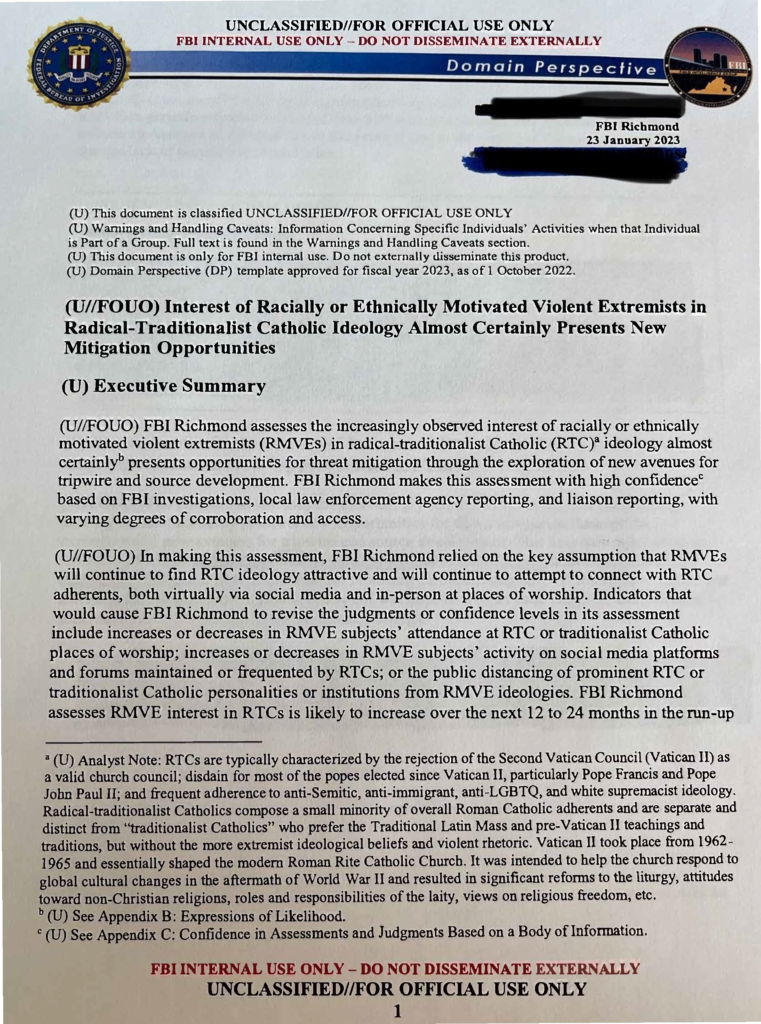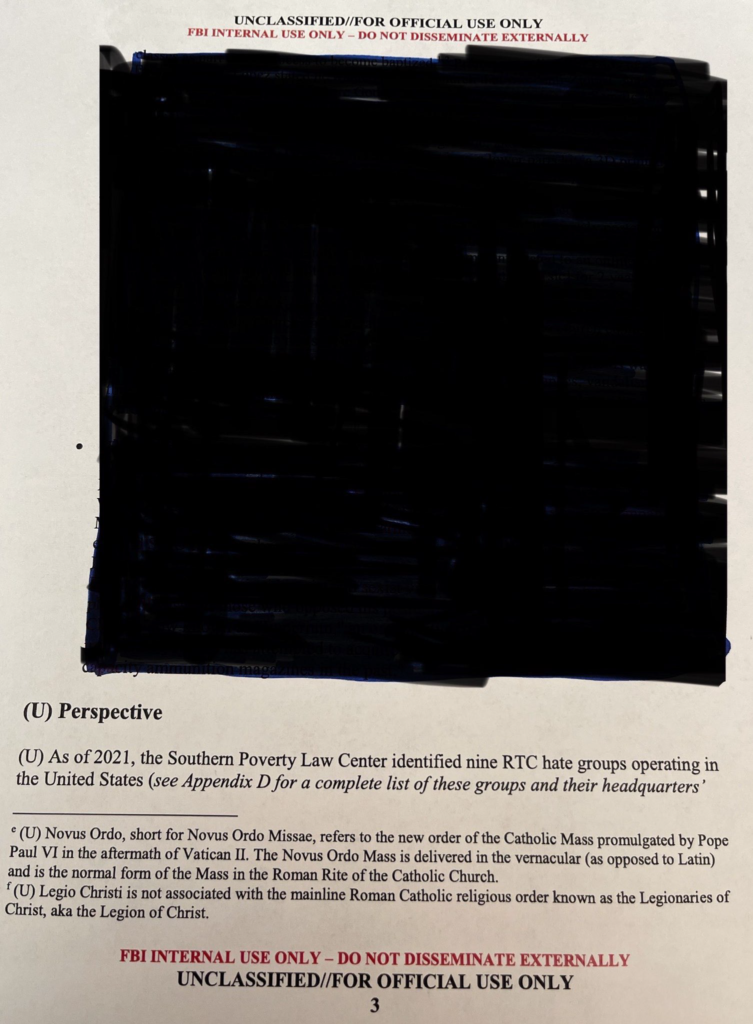
The Federal Bureau of Investigation rescinded a report on “radical-traditionalist Catholic ideology” on Thursday, one day after an FBI whistleblower published the document and The Daily Signal reached out to the FBI for comment. Former FBI agents condemned the document for citing the Southern Poverty Law Center, a left-wing smear factory infamous for branding mainstream conservative and Christian organizations “hate groups” and placing them on a map with Ku Klux Klan chapters.
“While our standard practice is to not comment on specific intelligence products, this particular field office product—disseminated only within the FBI—regarding racially or ethnically motivated violent extremism does not meet the exacting standards of the FBI,” the FBI told The Daily Signal in a statement emailed Thursday.
“Upon learning of the document, FBI Headquarters quickly began taking action to remove the document from FBI systems and conduct a review of the basis for the document,” the bureau added. “The FBI is committed to sound analytic tradecraft and to investigating and preventing acts of violence and other crimes while upholding the constitutional rights of all Americans and will never conduct investigative activities or open an investigation based solely on First Amendment protected activity.”
“We got briefings that SPLC was not legitimate when I was at Quantico,” Kyle Seraphin, who served six years at the FBI as a special agent before getting indefinitely suspended without pay in June 2022, told The Daily Signal in a phone interview Wednesday. Seraphin published the document on UncoverDC.com Wednesday.
The document, “Interest of Racially or Ethnically Motivated Violent Extremists in Radical Traditionalist Catholic Ideology Almost Certainly Presents New Mitigation Opportunities,” bears markings reading “UNCLASSIFIED/FOR OFFICIAL USE ONLY” and “FBI INTERNAL USE ONLY—DO NOT DISSEMINATE EXTERNALLY.”
“In making this assessment, FBI Richmond relied on the key assumption that [racially or ethnically motivated extremists] will continue to find [radical-traditionalist Catholic or RTC] ideology attractive and will continue to attempt to connect with RTC adherents, both virtually via social media and in-person at places of worship,” the document states.
The document claims:
RTCs are typically categorized by the rejection of the Second Vatican Council (Vatican II) as a valid church council; disdain for most of the popes elected since Vatican II, particularly Pope Francis and Pope John Paul II; and frequent adherence to anti-Semitic, anti-immigrant, anti-LGBTQ, and white supremacist ideology. Radical-traditionalist Catholics compose a small minority of overall Roman Catholic adherents and are separate and distinct from “traditionalist Catholics” who prefer the Traditional Latin Mass and pre-Vatican II teachings and traditions, without the more extremist ideological beliefs and violent rhetoric.
The FBI Richmond document does not hide its sourcing for information about “radical-traditionalist Catholics.” In a “perspective” note, the document states, “As of 2021, the Southern Poverty Law Center identified nine RTC hate groups operating in the United States.”
The document, dated Jan. 23, 2023, includes an appendix with a complete list of organizations the SPLC brands “radical traditional Catholic hate groups,” without any note that the SPLC’s “hate group” accusations have faced severe criticism and without any note about reaching out to the organizations for comment about the claim.

As I explain in my book “Making Hate Pay: The Corruption of the Southern Poverty Law Center,” the SPLC took the program it used to bankrupt organizations associated with the Ku Klux Klan and weaponized it against conservative groups, partially to scare donors into ponying up cash and partially to silence ideological opponents.
After the SPLC fired its co-founder amid a racial discrimination and sexual harassment scandal in 2019, a former staffer claimed that the SPLC’s accusations of “hate” are a “cynical fundraising scam” aimed at “bilking northern liberals.” Critics across the political spectrum have voiced opposition and alarm at the organization’s hate group smears.
In 2012, a terrorist targeted the Family Research Council’s headquarters in the nation’s capital, entering the lobby with a semiautomatic pistol and then shooting and wounding a guard. The man told the FBI that he found the conservative organization on the SPLC’s “hate map” and intended to kill everyone in the building.
The man later pleaded guilty to committing an act of terror and received a 25-year prison sentence. The SPLC condemned the attack, but has kept the Family Research Council on its hate map ever since.
Using the SPLC in this manner violates longstanding FBI practices, according to George Hill, whose 11 years at the bureau included a stint as a supervisory intelligence analyst. Among other things, he supervised the reports regarding the Boston Marathon bombing in April 2013.
Hill told The Daily Signal in a phone interview Wednesday that one of his “primary roles” was “the editing and approval process of the various intelligence products. There are a very strict group of guildelines that come from the Directorate of Intelligence. The product in question here is an intelligence bulletin, which is primarily designed in this particular case for distribution to bureau only personnel.”
He said he would call the report “poorly sourced from sources who use unsubstantiated data to draw their own conclusions and not in compliance with FBI publication guidelines.”
Hill noted that the Directorate of Intelligence released guidelines barring analysts from relying on the SPLC. “They would have had to either change the guidelines since I left that you can now use the SPLC or the author and their supervisor who approved the final document knowingly violated the Directorate of Intelligence guidelines,” he said.
Steve Friend, a former SWAT team member who worked at the FBI for eight years before getting indefinitely suspended last September, also faulted the FBI for the document.
“It is clear that the FBI is failing to utilize counterbalancing sources of information it its efforts to generate intelligence products,” Friend told The Daily Signal. “Relying solely on sources such as SPLC, The Atlantic, and Salon demonstrates the FBI is beginning with a predetermined conclusion to target traditionally conservative Americans for undue scrutiny and persecution.”
Seraphin, the whistleblower who published the document, noted that there are 70 million Catholics in the U.S. and said, “This should get their blood boiling.”
“They’re literally opening the door to targeting any other Christian faith,” with this report, he warned.
The SPLC claims it does not brand Christian organizations “hate groups” merely because they oppose same-sex marriage, but many of its accusations boil down to a disagreement on LGBT issues. The SPLC branded the Ruth Institute an “anti-LGBT hate group” in part because its founder, Jennifer Roback Morse, called homosexual activity “intrinsically disordered,” pulling a direct quote from the Catechism of the Catholic Church.
Virginia Attorney General Jason Miyares addressed the document in comments to The Daily Signal.
“The right to worship freely is fundamental and sacred,” Miyares said. “This sort of government abuse—the FBI spying on faithful Virginia Catholics and treating them like potential terrorists—is what I expect in Communist Cuba. Not here, in a country founded as a beacon of freedom for religious minorities.”
He described it as “truly terrifying that the FBI might be taking its pointers from a thoroughly discredited report issued by the far left-wing Southern Poverty Law Center. Christopher Wray and Merrick Garland have a lot of explaining to do. Virginians deserve to know whether the federal government is treating them like terrorists because of how they worship.”


Have an opinion about this article? To sound off, please email letters@DailySignal.com and we’ll consider publishing your edited remarks in our regular “We Hear You” feature. Remember to include the url or headline of the article plus your name and town and/or state.

